March 10, 2020
 by Jakub Kubrynski / March 10, 2020
by Jakub Kubrynski / March 10, 2020

While it’s well-known that IT is an in-demand field, you might not know the latest skills you need to succeed in 2020.
IT is an ever-growing field. Its growth is so much that the demand for software engineers will continue to grow at a rate of 26%, which is over five times faster than the average for all occupations (5%).
As the war for tech talent is fiercely competitive, recruiters who hire people with IT skills in demand need to understand the ever-changing tech hiring landscape. In this article, you’ll find some inspiring insights from numerous industry studies including the 2019 Stack Overflow Developer Survey, the 2020 IT skills report, Dice 2020 Tech Salary Report, and Burning Glass. Along with the tips presented here, they’ll give you a good understanding of the top IT skills in demand for 2020.
The web runs on JavaScript – and that’s a fact.
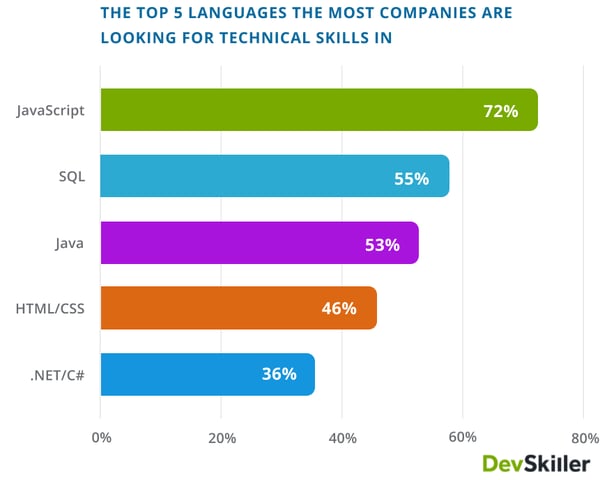
Over 94% of websites use JavaScript, which is also the #1 most popular language according to the 2019 Stack Overflow Developer Survey.
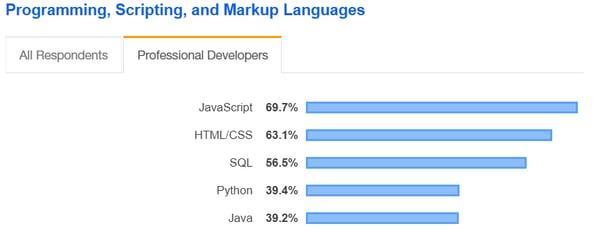
JavaScript is also the most popular IT skill candidates are tested in, included in 40% of all test on the platform. SQL comes second with 33% and Java comes third with 31% of all tests. That’s an interesting change from last year’s results. In the 2019 Global Technical Hiring & Skills Report, Java came first (37%), SQL occupied second place with 34%, and JavaScript came third with 29%.
It’s not just JavaScript or Java on their own recruiters are after. According to the data, more than half of all developers tested on the platform get a JavaScript assessment, regardless of their main focus. The most common IT skill combinations according to the research are as follows: JavaScript + CSS, JavaScript + HTML, Java + SQL, and JavaScript + SQL.
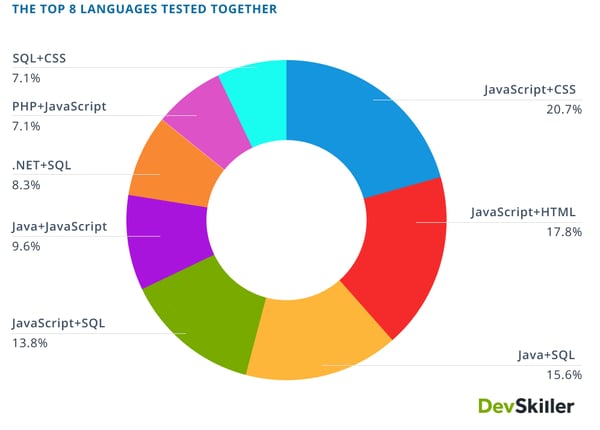
What this shows is that this year, recruiters seem to be after more comprehensive IT skills. In practice, this shows that that coding tests are built differently to assess a much wider set of skills. Instead of looking for very specific IT skills, employers are more interested in developers who have additional skills outside of their main expertise.
While it is clear that JavaScript has cemented its reign, it’s interesting to see that SQL (Structured Query Language) is still doing great. SQL is the standard language for relational database management systems used heavily in data science. It’s definitely one of the top IT skills 55% of companies are looking for.
The popularity of SQL is not really surprising given the amount of data which is collected and churned out by thousands of businesses every single day. That said, it’s only possible to make sense of big data if you have the right skillset. Data scientists rely heavily on SQL skills which is why SQL as a skill is in such high demand. Interestingly, in the 2019 edition of of the Global Technical Hiring and Skills Report, SQL was the #1 IT most developers got tested regardless of their focus.
As you can see from the chart in the section above, SQL is present in four out of the eight most popular IT skills combinations tested throughout the whole of 2019. What this shows is that developer candidates are expected to have at least a basic understanding of SQL, regardless of what they specialize in. Also, it is evident that when it comes to full-stack development, a very desirable combination of skills is JavaScript on the front-end paired along with SQL for the server-side.
Other studies also find SQL to be a critical IT skill. According to data from Burning Glass (via Dice), SQL was also the #1 most requested skill as of February 2020.
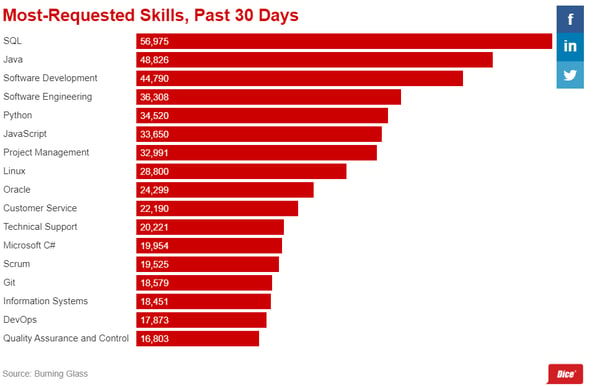
When it comes to geographical insights since last year, there’s been quite a lot of commotion. According to the data from the IT skills report, as of 2020, the highest-scoring developers can be found in Latvia, the Netherlands, and Italy.
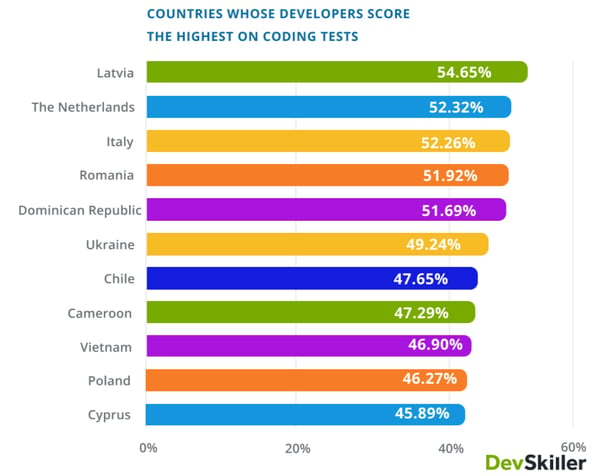
What is interesting is that the Netherlands came second both this year and last year. According to the State of the European Tech 2019 report, “countries such as the Netherlands, Spain and Poland still have the potential to exceed expectations in the European tech ecosystem” when looking at the the number of professional developers compared with the amount of capital invested in countries across the region.
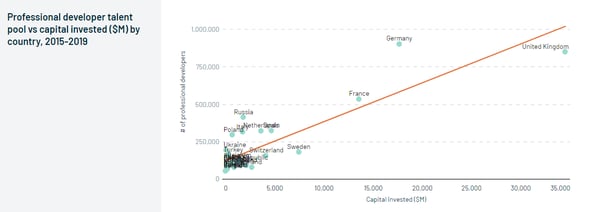
Last year, developers from New Zealand did the best on their coding tests, followed by the Netherlands and Russia.
In the past few years, New Zealand became an attractive spot for many developers, including the US. One great example of its perceived attractiveness is the 2017 municipal program called LookSee Wellington. The program was designed to fly in 100 developers for interviews, wining, and dining. It anticipated getting 2,5000 applicants. The program received almost 50K applications from talented developers working for companies like Amazon, Facebook, M.I.T., and NASA. The average applicant age was 37 years, which meant it was mostly experienced candidates who are not easy to attract.
Trends like these explain the increasing popularity and level of proficiency of certain areas, which are seen by new tech hubs away from the political upheaval, where a work-life balance is also easier to achieve.
What does this all mean for recruiters worldwide? There are a number of ways you can use these findings to maximize your technical recruitment results.
In IT recruitment, there’s definitely a scarcity of talent. Good developers who have the right skills tend to get a never-ending stream of recruiter mail. There are some standards which can help you increase your response rate at the sourcing stage:
Always disclose salary levels as early as possible because salary is the number one reason why 71% of all tech workers change jobs.
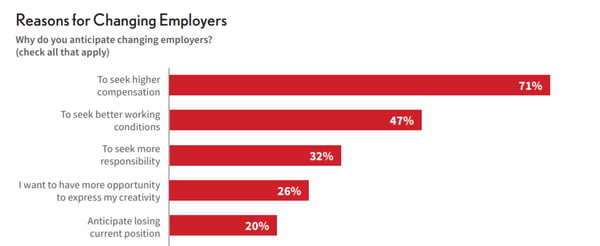
Source: Dice
If you’re not transparent about the compensation early in the process, your chances of getting a response are dim. There are a number of resources you can use to calculate pay, such as pay benchmarking sites like PayScale or ZipRecruiter, as well as tech salary calculators. These calculate salary levels from a number of variables including the job title, location, and years of experience. Make sure you’re offering fair pay for the job to be done.
This holds true especially for less experienced technologists (early in their career) who are now typically rewarded with greater salary growth. According to Dice, developers with “3-5 years of experience saw salaries increase by 7.2% in 2019, compared to 4.7% for those with 6-10 years of experience, 2.8% for those with 11-15 years of experience and 1.2% for those with more than 15 years of experience.”
When recruiting people with IT skills, it’s smart to look for people to hire remotely or relocate. You can use that info both locally and globally:
Assessing developer skills early in the recruitment process allows you to cut the number of unnecessary interviews. This means that your tech teams’ and recruiters’ very pricy time is limited only to viable candidates.
This year’s data proves that Wednesday is the best day to send out the coding test invites.
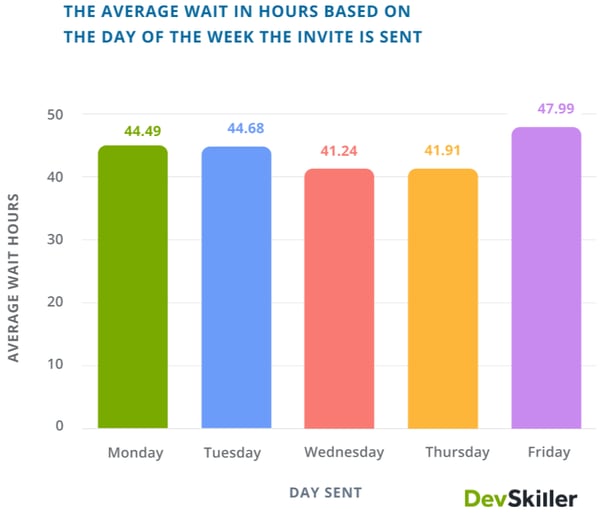
Interestingly, as indicated in the chart above, last year (2019) Tuesday was the best day to send out coding tests invites. What’s more, the time candidates take to take a test is shorter this year (2.27 days vs. 2.88 days last year).
This change shows that developers are potentially more serious about the recruitment process. It could also be a result of attempting to participate in multiple recruitment processes on the side of the candidates.
You’d think that the desired benefits don’t really change much year to year. Surprisingly, that’s not really the case. While the biggest gap (31%) between attractive vs. received benefits still belongs to training and certifications (0% change year over year), some new attractive benefits have emerged in tech.

Based on Dice's data, developers are most becoming more interested in “emerging” benefits such as college tuition reimbursement, wellness programs, maternity and paternity leave, and paid volunteer opportunities.
As of 2020, only 38% of tech workers said they would like to change employers this year, down from 45% in 2019. What this means is companies hiring people with IT skills need to reexamine the factors which typically mean people stay.
These include:
As Dice rightly points out, “Dissatisfied technologists are mobile technologists.” Make sure all your technical recruitment efforts are designed with both the company and the candidate in mind. Since tech is such a competitive space, the importance of knowing how other companies hire developers cannot be neglected.
Now that you know what IT skills are in demand, discover the best IT outsourcing services available to find top-tier professionals for your business needs.
Jakub Kubrynski is the CEO of Devskiller, a developer screening & online interview platform powered by RealLifeTesting™. He’s an experienced Java developer and development manager as well as an avid conference speaker and business-aware entrepreneur.
Every idea for a website starts somewhere.
 by Mara Calvello
by Mara Calvello
The tech industry has been growing for decades and the demand for technical workers isn’t...
 by Tom Winter
by Tom Winter
What comes to your mind when you think of campus recruitment?
 by Aishwarya Lohi
by Aishwarya Lohi
Every idea for a website starts somewhere.
 by Mara Calvello
by Mara Calvello
The tech industry has been growing for decades and the demand for technical workers isn’t...
 by Tom Winter
by Tom Winter


